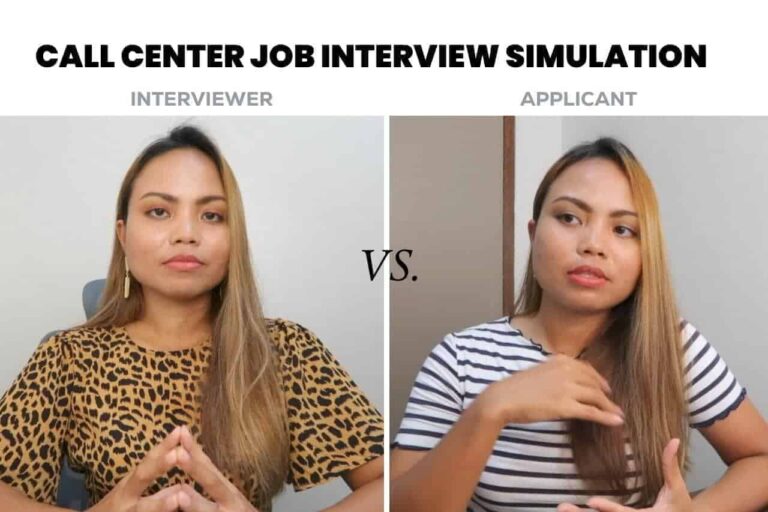To answer the call center job interview question, “What is your greatest weakness?”, reveal a weakness that you truly are struggling with then explain what you’re doing to rise above that weakness. You also wanna give the impression that you are highly aware of your weakness. If you can show this in your answer, you’re good! If you need some sample answers, read on.
Table of Contents
How to answer What is Your Greatest Weakness?
To answer What is your greatest weakness? follow these two steps:
Step #1: Reveal a weakness that is okay to have in a call center workplace.
What I mean by “okay to have in a call center” is a weakness that won’t interfere with your tasks as a call center agent.
For example, you can freely talk about your anxiety with face-to-face conversations with new people. This isn’t specifically a problem in a call center workplace.
Once you’re in, you’re gonna be working with the same people. And while you’ll talk to new customers, you’ll only be doing it over the phone; not face to face.
But let’s say for example that your weakness is that you hate interacting with your superiors on a daily basis, then that’s gonna be a problem. As a call center agent, you’re expected to submit to your Team Leads, Quality Analysts, and Operations Manager every single day.
Or maybe your weakness is that you’re super impatient. In this case, you don’t wanna tell your interviewer this. It’s just not gonna contribute to you landing that job.
Step #2. Explain the steps you’re taking to overcome that weakness.
Each applicant, no matter how smart and experienced, will always have weaknesses.
However, you don’t want is to end your answer by talking about your weakness. Instead, you wanna end it with a strong statement detailing the specific steps you’ve taken to rise above that weakness.
This way, you’re able to end your answer on a positive note instead of a weak one.
Also, you don’t have to say that you have completely overcome your weakness. It would no longer be a weakness if you did. You wanna create the impression that you’re dealing with it regularly but it’s under your control. This way, it’s more realistic.
Below are some sample answers:
Sample answer #1:
“I am terrible at making small talks. I used to convince myself that this is not a weakness. That because I’m an introvert, this is just how I’m wired. And that small talks are superficial anyway.
“But then I realized, “Hmm, small talks are actually necessary. You see, you simply can’t ask a stranger about his regrets and aspirations. That’d be weird! You first need to test the waters and make bite-sized interactions. You can only do that with small talks.
“And I thought to myself, “Well, this is definitely something I should improve on.” So every day, I made a conscious effort to smile at strangers, talk to them during parties, and I think I’m making progress. Face-to-face conversations with new people don’t rattle me anymore. I’m still not the greatest at it but I’ve definitely improved. I actually even enjoy it at times.“
What’s good about this answer:
If there’s one thing I love the most with this answer, it’s the self-awareness demonstrated in it. The applicant said that, at first, she didn’t think that being bad at small talks is a weakness. But when she realized the importance of it, she realized that she had to improve on it and then she took action.
This is a great way to show your interviewer that you have a high level of self-awareness about your shortcomings. And in any workplace, that’s always a good thing.
Will this weakness interfere with the tasks of a call center agent? Not exactly. Customers who love making small talks are only at 1%. Most of the time, they’re in a rush and need to get things done ASAP. Besides, if the applicant really has to make small talks, it’s nothing she couldn’t handle anyway. She might be a bit uncomfortable but definitely not incapable.
Lastly, in the last paragraph, the applicant detailed the specific steps she took to rise above that weakness. She didn’t say that she’s overcome it completely — after all, it’s her greatest weakness — but she’s definitely improving which is what matters.
Sample answer #2:
“My greatest weakness is that I tend to procrastinate. When I was still a student, I would work on my projects at the last minute and end up scrambling when the deadline comes.
“What I noticed was, I only tend to procrastinate on big and complicated projects but never on small ones. For example, I could work on a regular daily assignment with no problem but working on my thesis is just too overwhelming.
“To deal with this, I read blogs about productivity and one technique that particularly works for me is to break down a large project into a series of mini-projects. This way, I’m not overwhelmed and I tend to feel motivated every time I complete a single mini-project.“
What’s good about this answer:
In this answer, the applicant didn’t just stop on her weakness. She gave the interviewer a deeper insight into when she tends to procrastinate and the possible reason why she does. Explaining the likely reason for your weakness will show your interviewer that you’re highly aware of your weakness (which is always a good thing).
Will this weakness interfere with the tasks of a call center agent? Not exactly. In a call center, you do the job in front of you. It isn’t project-based. The phone rings, you answer, you go home. Sure, you may still have to send follow up emails occasionally but this task isn’t complicated at all so it won’t particularly affect this applicant’s performance.
Lastly, she explained the step she took to deal with her weakness. Because she only procrastinates on big and complicated projects but not in small ones, she figured she should divide a big project into mini-projects to trick herself into doing them. This solution is great because it addresses the root cause of her procrastination.
Avoid saying these:
“I don’t have a weakness.”
What’s wrong with this answer:
Each of us, no matter how smart and experienced, will always have weaknesses. To claim otherwise is just ridiculous. If you say this, it only means one thing: that you definitely have a weakness but you are not self-aware enough to notice it.
“I’m a workaholic. Even on holidays, you’ll find me sitting at my desk doing the next day’s task. As a result, I barely have time for my friends and families.”
“I’m a perfectionist. As a result, it’s hard for me finish a project on time because of my high standards.“
What’s wrong with these answers:
The problem with these answers is that they’re overused. They’ve become clichés. They may have been striking and thought-provoking answers but because they’re overused, they end up sounding unoriginal and even insincere.
Also, they sound rather manipulative.
You see, in our society, being workaholic and perfectionist are considered as strengths, not weaknesses. When you say this, you aren’t really revealing an actual weakness. Instead, you’re clothing a strength as a weakness and it could look like you’re tricking your interviewer.
It’s like telling your interviewer, “My greatest weakness is that I’m a workaholic and a perfectionist so I always make my boss happy and richer.”
Most interviewers aren’t likely gonna appreciate this.
You Might Also Like:






